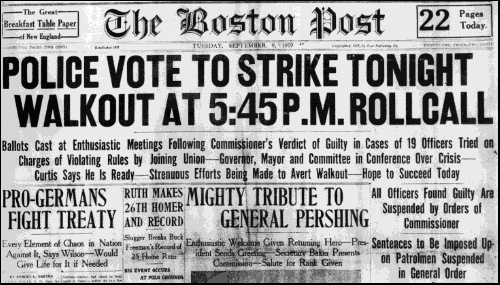
“Nothing fueled the anti-union Red Scare propagandists more than the Boston police strike of 1919.”
The political climate after World War I was characterized by immense fear, instilled by government and big business propaganda about a “Communist takeover of the United States.” One of the main targets of this propaganda was the labor movement that was organizing workers to collectively bargain for fair wages and hours. The Red Scare was increased as police forces across the nation began to organize in unions.
In 1918, Congress passed the Sedition Act, to “punish unpatriotic speech during wartime,” leading to the arrest, imprisonment, execution and deportation of dozens of unionists, anarchists and communists. Militant union leader Eugene Debs (1855-1926) was sentenced to 10 years in prison for making a speech opposing U.S. Entry into World War I.
Police in Boston had a number of reasons why they wanted to join a union. Like any other worker in any other sector, they felt that their wages were too low and their hours were too long. “Their wages were even significantly lower than the earnings of most unskilled factory workers. For this meager pay they were asked to work as many as seventy-two to ninety-eight hours a week.”
By 1913, the Boston Police Department had not significantly increased the salary of new officers since 1854, a period of 60 years, when patrolmen were paid two dollars a day. In 1898, a graduated scale was set, but because of a “running dispute” between the mayor and city council, the pay increases were not implemented for 15 years. By the time they were finally put in place during 1913, living costs had increased 37 percent from 1898 and by 1918 they increased another 79 percent.
The salary for patrolman was set at $1,200 a year, which was less than half what many World War I workers were earning; and out of this they had to buy their own uniforms and equipment which cost over $200. New recruits, who had to be at least 25 years old, received only two dollars a day, or $730 a year, the same pay they would have received in 1854 when the department was formed. During the second year of service, the pay was increased 25 cents a day to $821.25 annually and in the third year, the wages were raised to $1,000 finally reaching $1,200 during the fourth year of service.
The Boston Police force, discouraged by decades of negligence paid to their numerous grievances, joined the Boston Social Club, affiliated with the AFL, in August of 1919. Police Commissioner Edwin Curtis believed that a police officer could not belong to a union and serve his proper duty at the same time. Curtis promptly suspended nineteen police officers who were working as union organizers.
In retaliation to the suspension of the nineteen union officers and the Police Commissioner’s refusal to allow them to join the AFL, the Boston Police went on strike.
A few people took advantage of the situation, looting stores and breaking windows. As a result, the State Guard was called in to stop the looters.
The press worked hard to turn public opinion against the Police. The LA Times wrote, “…no man’s house, no man’s wife, no man’s children will be safe if the police force in unionized and made subject to the orders of Red Unionite bosses.”
At one point, national AFL President Samuel Gompers suggested that the officers return to work and to the bargaining table. But Commissioner Curtis refused to consider allowing the striking officers their jobs and completely replaced the force. The Commissioner had the full support of President Woodrow Wilson and then Governor Calvin Coolidge, who had made himself a “national hero” by quelling the strike.
For years after the strike and the frenzy of anti-union press coverage, public opinion of public sector strikes was much less sympathetic than toward strikes in the private sector.
The Massachusetts AFL-CIO and Wikipedia contributed to this article
Photo: Massachusetts AFL-CIO












Comments